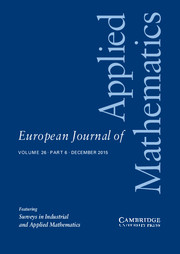Crossref Citations
This article has been cited by the following publications. This list is generated based on data provided by Crossref.
Cardin, Pedro T.
de Moraes, Jaime R.
and
da Silva, Paulo R.
2015.
Persistence of periodic orbits with sliding or sewing by singular perturbation.
Journal of Mathematical Analysis and Applications,
Vol. 423,
Issue. 2,
p.
1166.
Szalai, Robert
2019.
Model Reduction of Non-densely Defined Piecewise-Smooth Systems in Banach Spaces.
Journal of Nonlinear Science,
Vol. 29,
Issue. 3,
p.
897.
Wechselberger, Martin
2020.
Geometric Singular Perturbation Theory Beyond the Standard Form.
Vol. 6,
Issue. ,
p.
127.
da Silva, Paulo R.
and
de Moraes, Jaime R.
2021.
Piecewise-Smooth Slow–Fast Systems.
Journal of Dynamical and Control Systems,
Vol. 27,
Issue. 1,
p.
67.
Simpson, D.J.W.
2022.
Dimension reduction for slow-fast, piecewise-linear ODEs and obstacles to a general theory.
Physica D: Nonlinear Phenomena,
Vol. 439,
Issue. ,
p.
133368.
Kong, Fanchao
and
Zhu, Quanxin
2023.
Synchronization of discontinuous competitive networks modeled by Filippov singular perturbation system: time-scales dependent settling-time.
Nonlinear Dynamics,
Vol. 111,
Issue. 12,
p.
11087.
Bettini, Leonardo
Cenedese, Mattia
and
Haller, George
2024.
Model reduction to spectral submanifolds in piecewise smooth dynamical systems.
International Journal of Non-Linear Mechanics,
Vol. 163,
Issue. ,
p.
104753.


